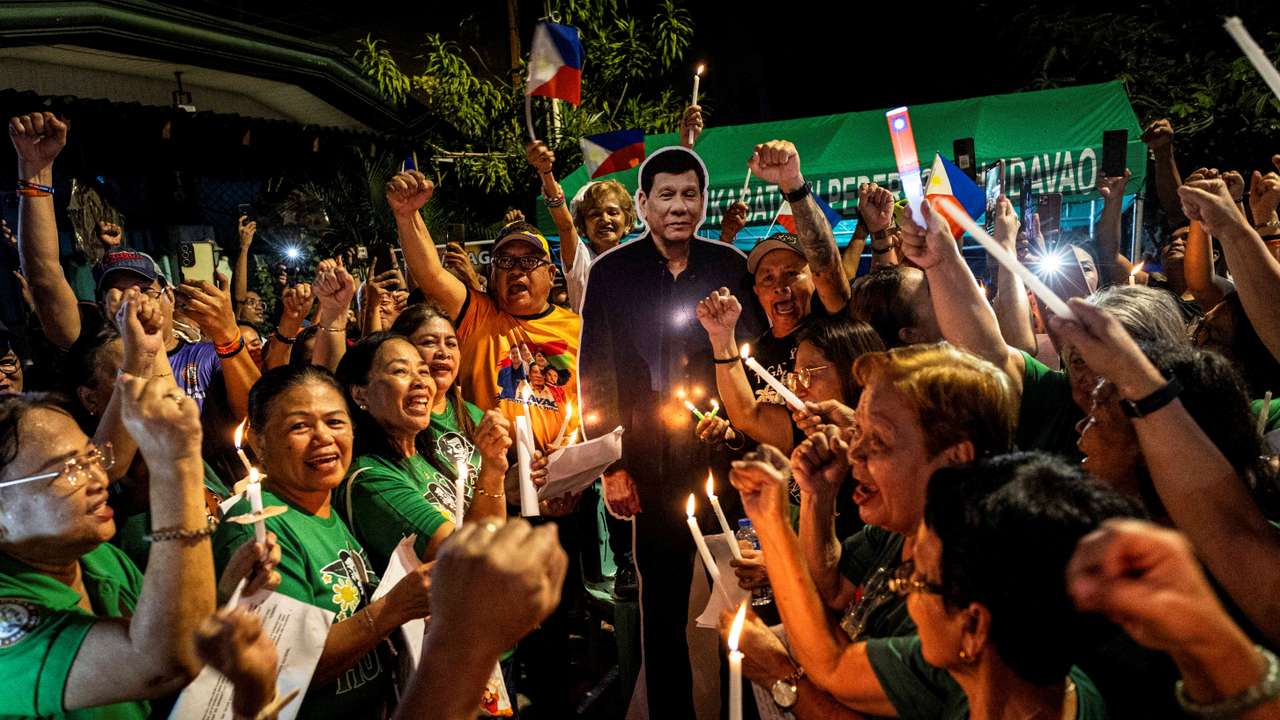In custody in the Hague, on ballot at home: Philippines' Duterte runs for mayor

By Eloisa Lopez and Karen Lema
Former Philippine President Rodrigo Duterte spends his days in a small, spartan room in detention at the Hague, awaiting trial for a bloody war on drugs that killed thousands during his time in office.
But halfway around the world, in his hometown of Davao City, Duterte is on the ticket for mayor in midterm elections on Monday that he is widely expected to win, riding on support in the family stronghold, though it may not translate nationwide.
"I've seen what he accomplished as both mayor and president, from his fight against drug lords to what he did for the country," said Jennifer Maumbas, 28, a worker in a small cafe that displayed Duterte's visage on a banner.
"No matter what happens, we're solidly for Duterte."
Duterte's arrest in March, following a request by the International Criminal Court, was a major blow to his powerful family, whose popularity surged after he swept to power in 2016 from his position as a maverick, crime-busting mayor.
As president, the tough-talking Duterte upended Philippine foreign policy and launched a "war on drugs" that rights groups say killed significantly more than a police estimate of 6,000, for which he is being tried in the Netherlands.
Yet his influence beyond Davao is far less certain, as the polls shape as a test of how far incumbent President Ferdinand Marcos Jr has managed to subdue the Dutertes' political machine, born in the southern city.
The Duterte name has a kind of mythic status in Davao, but perhaps less nationwide, said Ederson Tapia, a specialist in public administration at the University of Makati.
"All indications are that they still have a solid base," he added. "Whether that's enough to carry a serious campaign in 2028 remains to be seen - especially with the vice president now facing an impeachment complaint."
Duterte's daughter, Vice President Sara Duterte, is seen as a potential contender in the 2028 presidential elections, but is besieged by political woes of her own.
She faces an impeachment trial on charges including a threat to assassinate Marcos, whose key ally she was in a 2022 team hailed as a powerhouse union of political dynasties.
But policy disagreements, power struggles and competing ambitions shattered the alliance, raising the stakes for both camps ahead of Monday's elections, in which more than 18,000 positions are up for grabs.
These include 317 congressional seats and thousands of local posts, but the fiercest contest centres on a dozen spots in the upper house Senate, which wields outsize influence on national affairs, its 24 members being jurors in impeachment proceedings.
Marcos' candidates remain ahead in polls and appear poised to dominate the Senate race, despite the sympathy generated for the Duterte camp by his arrest and detention.
DRAMATIC ARREST
As president from 2016 to 2022, Duterte has long defended his drugs crackdown, saying it was meant to make the Philippines safer and that police were ordered to shoot only in self-defence.
His arrest only cemented support for him in Davao, a city of 1.8 million, where he was mayor for more than two decades before becoming the first president from the Mindanao region.
"We cried. We could not sleep for three days," said Joel Sagosoy Valles, who runs a small restaurant plastered with pictures documenting Duterte's career, while he recounted how he and his family watched footage of the arrest.
A win on May 12 could prove a critical asset in achieving Sara Duterte's ambitions, as a strong regional base ensures a loyal bloc of voters, offering leverage in power struggles and a launchpad for national ambition.
"Duterte would then continue to have power from which to launch his attacks against the Marcos administration," Jean Franco, a professor of political science at the University of the Philippines, said of the former president.
"They can use their power in Davao and the Mindanao area to help elect the next president."
If he does win, however, Duterte would be unable to take office, Philippine officials say, so the role would pass to the winning vice mayor, probably his youngest son, Sebastian.
Some in Davao wear T-shirts with slogans demanding Duterte's return.
"We believe he still has much to offer, not just for Davao, but for the country," said Dennis Archie Jabutay, 38, who travelled 300 km (186 miles), to join Duterte's 80th birthday rally in March.
Not all residents want Duterte to return as mayor, however, with some turning to his main rival, Karlo Nograles, a former cabinet secretary and Davao congressman who hails from another Philippine political dynasty.
"We need some change," said Arlene Noyney, 50. "I just want things to be peaceful. No fights, no killings."
This article was produced by Reuters news agency. It has not been edited by Global South World.